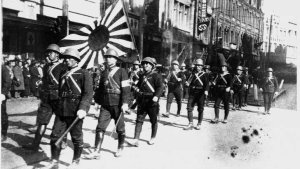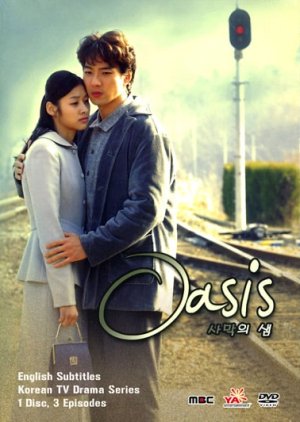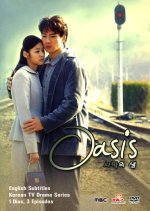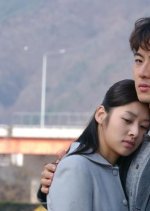 Japanese Occupation of Korea ~ Part 2
Japanese Occupation of Korea ~ Part 2 Fleeing an arranged marriage to a man she doesn't love, In Hui meets Gi Hyeon, an aspiring musician whose most prized possession is his late father's saxophone. In Hui and Gi Hyeon cross paths over the years and slowly fall in love. In Hui ends up in the radio business working for Yeong Jin, a Korean national who supports the Japanese government in its occupation of Korea. As Gi Hyeon's musical career begins to take off, he discovers that Yeong Jin is the same man who murdered his father many years before. As the tension builds, Gi Hyeon is suspiciously sent to work hard labor at a coal mine in Japan. Upon the Japanese defeat in World War II, Gi Hyeon returns home, full of revenge, to find his life turned upside down. Edit Translation
- English
- magyar / magyar nyelv
- dansk
- Norsk
- Native Title: 사막의 샘
- Also Known As: Desert Spring , The Fountain of the Desert
- Genres: Romance, Drama
Cast & Credits
- Song Il GookGi HyeonMain Role
- Jang Shin YoungIn HuiMain Role
- Lee Hyung Chul Main Role
- Im Hyun Shik[Gi Hyeon's father]Support Role
- Shin So MiOk HuiSupport Role
- Yoon Joo Sang[In Hui's father]Support Role
Reviews

Close to the protagonists - format may be 'old', but script is round, coherent and flawless
I stumbled across "Oasis (2003)" or "Desert Spring" in the context of "Oasis" from 2023. I was curious if there were any parallels (besides the title). There are. Whether they are random or not, I don't know though. The 1940s/50s (in "Desert Spring"), like the 1980s/90s (in "Oasis"), are neuralgic phases of liberation from oppression in recent Korean history. HERE the last years of the Japanese colonial era and the Korean struggle for independence as well as the time under the occupying powers (e.g. USA) form the framework of the story, THERE the time of the dictatorship in the face of an increasing democracy movement. HERE it is radio, music and broadcasting, THERE film and cinema, that open up space for hope, visions, resistance and dreams. Here as there is a rival (who is HERE written more three dimensional than THERE) who refuses to see that the heart of his beloved already belongs to someone else. In both cases, the rival is on the side of power. In both cases the male protagonist is a talented but penniless young man who is in danger of getting underneath the wheels of the influential. Here as there, the female protagonist is a patent woman who knows what she wants.Apart from that, however, many things are different. In particular, the narrative style in "Desert Spring" is a lot more poetic, more visually impressive and with the camera emotionally closer to the protagonists than in "Oasis". Style and format may be 'old', but the script is round, coherent and flawless. HERE (more than THERE) the feelings (and struggles) of the two leads for each other take up most of the space. Almost the entire first episode tells the budding relationship between the two leads in impressive, emotional scenes with plenty of ambience of that time. The time from childhood to adulthood is sensitively sketched without many words. The sequencing and entanglement of events is suggested rather than worked out. However, the story is always close to the two young people who gradually come closer to each other over the years through a chain of coincidences. HERE the way to go is the goal. This was always against the background of Japanese colonial rule, the Korean followers on the one hand and the underground struggle for independence on the other. Music and radio form the context in which the two protagonists develop, prove themselves and finally meet and commit to each other as man and woman. But they don't live in a vacuum. For various reasons, Gi-hyun is a thorn in the eyes of the pro-Japanese collar & tie-wearers from the executive floor. Suddenly, Gi-hyun is on a red list. And even the end of colonial rule does not erase the past.
The KDrama only has three episodes, but they pack a punch. The third actually comes as a double pack with two hours. Impressively told, the story definitely leaves its mark. Even if the leads may not be so familiar to Western audience (compared to superstars from the newer KDrama productions), at least Song Il-gook has cult status in his own country, since "Jumong" at the latest.
A KDrama that uses creative means to reappraise a piece of bitter history in passing while telling a touching love story.
I stumbled across "Desert Spring" almost entirely by accident. Thanks to "Oasis" (2023) I found "Oasis" (2003). At this point, my sincere thanks go to the KDrama "Oasis" (from 2023), because without this reference to the namesake, the more than 20-year-old 'precursor' would certainly not have fallen at my feet.


























![Japanese Rule [1910 - 1945] - (movies & dramas)](https://i.mydramalist.com/Q2ol5t.jpg)
![Japanese Rule [1910 - 1945] - (movies & dramas)](https://i.mydramalist.com/jWDoyt.jpg)
![Japanese Rule [1910 - 1945] - (movies & dramas)](https://i.mydramalist.com/V4z5Et.jpg)
![Japanese Rule [1910 - 1945] - (movies & dramas)](https://i.mydramalist.com/qkbK5t.jpg)
![Japanese Rule [1910 - 1945] - (movies & dramas)](https://i.mydramalist.com/rkRPDt.jpg)























